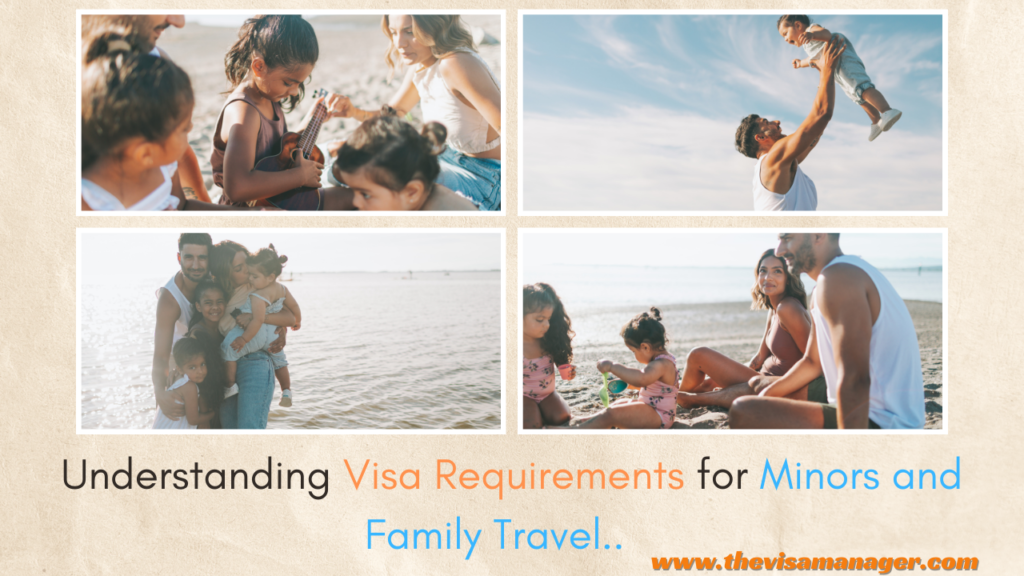
Traveling internationally with your family can be an exciting adventure, but it’s important to be well-prepared with the right visas, especially when traveling with minors. Visa requirements for children and families vary greatly by destination, and it’s crucial to understand the rules specific to each country to avoid unexpected delays. Here’s a detailed guide on what to consider when applying for visas for minors and family travel.
1. Visa Requirements for Minors: Key Points
Separate Visas for Minors:
Regardless of age, some nations require minors to apply for individual visas. Make sure to find out if a child’s visa is required because this even applies to newborns.
Proof of Parental Consent:
The destination nation may frequently want a consent letter signed by the non-traveling parent, especially when it comes to single-parent travel or when minors are traveling without both parents. Notarized letters are even required in some nations, particularly in cases when the parents are separated or divorced.
Unabridged Birth Certificates:
Unabridged birth certificates are frequently necessary for nations with stringent anti-child trafficking legislation. To make sure the youngster is traveling with their legal guardians, these documents, which attest to the child’s parents, can be sought.
2. Documents to Gather When Traveling with Minors
Passport:
Make sure every youngster has a current passport that is valid for the required amount of time. Passports must remain valid for at least six months after the dates of travel in certain countries.
Visa Applications:
If necessary, fill out separate visa applications for every minor. Keep in mind that each child may incur a different visa fee, so make appropriate plans.
Consent Form and Parental Documents:
Certain nations may demand proof of identity from both parents, such as copies of passports or national identification documents, in addition to a notarized permission letter.
Additional Identification for Guardians:
Additional documents establishing guardianship or custodial rights may be required for children traveling with guardians or family members other than their parents.
3. Destination-Specific Requirements
United States:
The U.S. requires all minors to have individual visas and their own passports. If a minor is traveling with one parent or a guardian, they may need a notarized consent letter from the other parent.
European Union (Schengen Zone):
Children must meet ordinary entrance requirements and require their own Schengen visas. Verify airline and Schengen nation policies as well, as the EU has strict regulations regarding unaccompanied minors.
South Africa:
Strict laws governing kid travel are well-known in South Africa. Unabridged birth certificates and, in certain situations, a parental consent form must be carried by minors.
4. Application Tips for Family Visas
Apply Early:
Families may have to wait longer for their visas to be processed, particularly if they need to provide extra paperwork like birth certificates or consent letters.
Verify Photo Requirements:
Every nation has different picture regulations, and images of minors must follow them. To prevent rejections, make sure your child’s photo satisfies the requirements of the destination.
Keep Copies of All Documents:
Keep copies of any vital records, such as passports, consent letters, and birth certificates. For convenience and extra security, keep both digital and hard copies on hand.
5. Practical Tips for Hassle-Free Family Travel
Have Extra Copies of Essential Documents:
Having extra copies of all important paperwork can help you avoid problems at customs or in an emergency, whether you’re traveling with kids or in a group.
Research Destination-Specific Rules:
Certain nations have special regulations, such as allowing certain nationalities to enter without a visa. The application procedure can be streamlined by being aware of these details in advance.
Plan for Longer Processing Times:
Applying for more than one visa may take longer than applying for just one, so it’s best to get started as soon as possible to prevent delays.
Final Thoughts
Knowing the requirements for a minor’s visa might make the process easier, whether it’s for a long journey or a family holiday. For the most up-to-date information, check with the embassy or consulate. If in doubt, get advice from a reputable visa agency to make the process easier.
